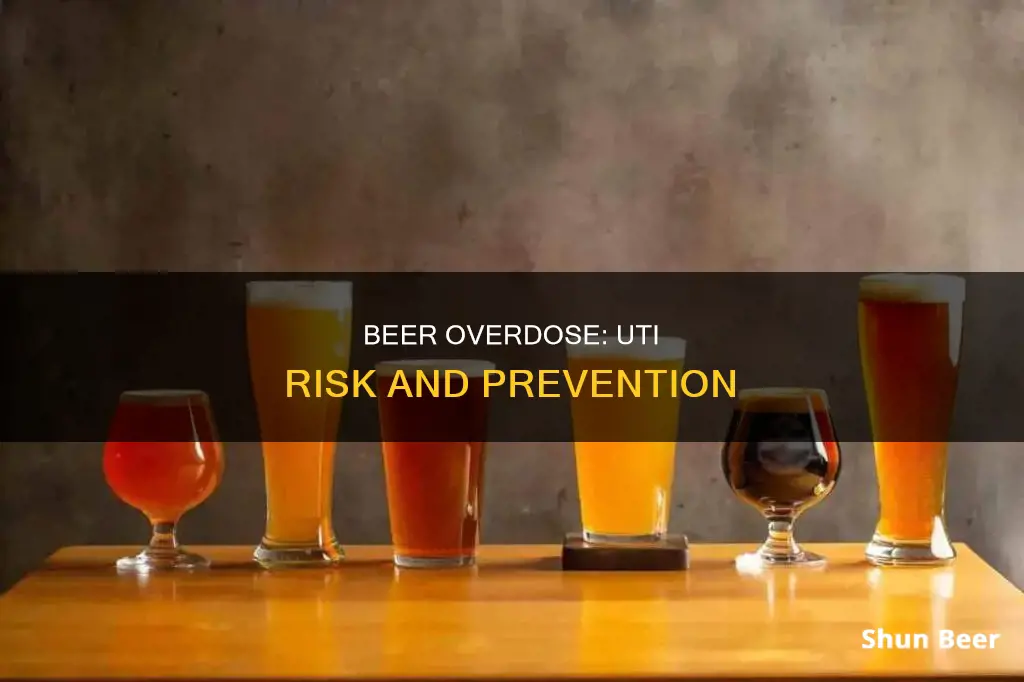
Drinking a lot of beer can increase the risk of a urinary tract infection (UTI) and worsen its symptoms. While alcohol does not directly cause UTIs, it can indirectly increase the risk of developing one. Firstly, alcohol lowers inhibitions and impairs judgement, which may lead to increased sexual activity. As bacteria are often transferred during intercourse, frequent sex increases the chance of a UTI. Secondly, alcohol weakens the immune system, making it harder for the body to fight infections. Thirdly, alcohol irritates the bladder and increases the acidity of urine, which can worsen UTI symptoms. Therefore, it is advisable to avoid alcohol consumption, especially when taking antibiotics to treat a UTI, as mixing the two can lead to unpleasant side effects.
| Characteristics | Values |
|---|---|
| Alcohol causing UTI | Alcohol cannot directly cause a UTI |
| Alcohol increasing risk of UTI | Alcohol can increase the risk of a UTI by impairing the immune system, increasing sexual activity, and irritating the bladder |
| Alcohol and UTI symptoms | Alcohol can worsen UTI symptoms by increasing the acidity of urine and irritating the bladder |
| Alcohol and UTI treatment | Alcohol should be avoided during UTI treatment as it can interfere with certain medications and cause side effects |
| Other drinks to avoid with a UTI | Caffeinated drinks, citrus fruit juices, and artificial sweeteners |
What You'll Learn
- Alcohol does not cause UTIs but can increase the risk
- Alcohol impairs the immune system, making it harder to fight infections
- Alcohol irritates the bladder and worsens UTI symptoms
- Alcohol and antibiotics can have unpleasant side effects when mixed
- Alcohol can cause kidney problems such as acute kidney injury

Alcohol does not cause UTIs but can increase the risk
UTIs (urinary tract infections) occur when unwanted bacteria, usually E. coli, enter the urinary tract and get into the bladder. If untreated, the bacteria can reach the kidneys, leading to serious health issues. While alcohol does not directly cause UTIs, it can increase the risk of developing one.
Firstly, alcohol can lower inhibitions and lead to sexual activity, which is a risk factor for UTIs, particularly in women. Alcohol consumption is often associated with sexual activity, which is the strongest predictor of UTIs.
Secondly, alcohol can impair the immune system, making it harder for the body to fight off infections like UTIs. Research shows that people who consume alcohol are at a higher risk of developing infections.
Thirdly, alcohol irritates the bladder and can worsen UTI symptoms. Alcohol is highly acidic, and this acid can irritate the bladder lining, causing discomfort and pain.
In addition, alcohol can also interfere with UTI treatment. Mixing alcohol with certain antibiotics used to treat UTIs, such as Bactrim (sulfamethoxazole/trimethoprim), can lead to unpleasant side effects, including increased heart rate, shortness of breath, and low blood pressure.
Therefore, while alcohol does not directly cause UTIs, it can increase the risk of developing an infection by impairing the immune system and creating an environment where bacteria can thrive. It can also worsen UTI symptoms and interfere with treatment, making it important for those prone to UTIs to limit their alcohol consumption.
Creating Jello Shots with Beer: A Fun Experiment
You may want to see also

Alcohol impairs the immune system, making it harder to fight infections
Alcohol does not directly cause UTIs, but it can increase your risk of getting one. This is because alcohol impairs the immune system, making it harder for your body to fight infections.
Alcohol interferes with many of the immune system's cells and chemical signals. A weakened immune system means your body has to work harder to fight off infections like UTIs. Research shows that you are at a higher risk of getting infections if you drink alcohol.
UTIs are caused by bacteria, usually E. coli, entering the urinary tract and getting into the bladder. If untreated, the bacteria can spread to the kidneys, leading to serious problems such as sepsis. Alcohol consumption can cause your urine to become more acidic, which irritates the bladder lining and causes E. coli bacteria to multiply even faster than usual.
Alcohol is also associated with other activities that can increase the risk of UTIs, such as sexual activity. A study of college-aged women found that a combination of alcohol consumption and sexual activity was often associated with their first UTI.
Pilsner Glasses: Best Beers to Enjoy in This Glassware
You may want to see also

Alcohol irritates the bladder and worsens UTI symptoms
Alcohol is highly acidic and can irritate the bladder, causing discomfort. This irritation can occur whether or not you have a urinary tract infection (UTI), but it is often worse if an infection is already present. The acid in alcohol can irritate the bladder lining, causing pain and a burning sensation during urination. This is similar to the symptoms of a UTI, so it is easy to confuse the two.
Alcohol can also cause the urine to become more acidic, which creates a more favourable environment for E. coli bacteria to multiply, increasing the risk of a UTI. In addition, alcohol can weaken the immune system, making it harder for the body to fight off infections like UTIs.
For these reasons, it is recommended that people with a UTI avoid drinking alcohol, as it can worsen their symptoms. Alcohol can also interfere with certain medications used to treat UTIs, such as antibiotics. Mixing alcohol with antibiotics can lead to unpleasant side effects, including increased heart rate, shortness of breath, and low blood pressure. Therefore, it is important to ask your doctor or pharmacist if it is safe to drink alcohol while being treated for a UTI.
Beer Enemas: Do They Work or Are They Dangerous?
You may want to see also

Alcohol and antibiotics can have unpleasant side effects when mixed
Drinking a lot of beer will not directly cause a urinary tract infection (UTI). However, it can increase your risk of developing a UTI and worsen your symptoms if you already have one. Alcohol can irritate the bladder and cause discomfort, which can make UTI symptoms feel worse. It can also lower your inhibitions and lead to increased sexual activity, which is a risk factor for UTIs. Plus, alcohol weakens the immune system, making it harder for your body to fight off infections like UTIs.
If you are taking antibiotics to treat a UTI, it is important to avoid alcohol. Mixing alcohol with antibiotics can cause unpleasant side effects and interfere with your treatment. Antibiotics can slow down or kill invading bacteria, but alcohol inhibits their effectiveness and can cause a range of negative side effects. Both alcohol and antibiotics can cause gastrointestinal issues, hinder cognitive function, concentration, and coordination, and interfere with sleep and hydration, which are critical components of recovering from an infection.
Some specific antibiotics that should not be mixed with alcohol include Metronidazole, Linezolid, Sulfamethoxazole, and Trimethoprim. Consuming alcohol while taking these medications can result in severe fatigue, headaches, dizziness, anxiety, chest pain, heart palpitations, digestive issues, and more. In some cases, mixing alcohol with antibiotics can even damage vital organs, including the liver and kidneys. Therefore, it is best to avoid alcohol until you have completed your course of antibiotics and your body has had adequate rest and nutrition to recover.
How Long Does Opened Beer Stay Fresh?
You may want to see also

Alcohol can cause kidney problems such as acute kidney injury
Alcohol can have a detrimental effect on kidney function, and excessive drinking can lead to acute kidney injury. While a small amount of alcohol now and then is unlikely to cause serious harm, drinking too much can negatively impact your health and worsen kidney disease.
The kidneys are responsible for filtering harmful substances from the blood. As alcohol is one of these substances, the kidneys of heavy drinkers must work harder. This causes changes in kidney function, reducing their ability to filter blood effectively. Alcohol also affects the kidneys' ability to regulate fluid and electrolytes in the body.
When the body is dehydrated, the drying effect can impact the normal function of cells and organs, including the kidneys. Alcohol can also disrupt hormones that affect kidney function. Furthermore, alcohol consumption can lead to high blood pressure and liver disease, which can, in turn, affect kidney function.
Binge drinking, usually defined as consuming more than four to five drinks within two hours, can cause a person's blood alcohol level to reach dangerous levels. This can lead to a sudden drop in kidney function, known as acute kidney injury. In such cases, dialysis is required until the person's kidney function returns to normal. While acute kidney injury usually resolves over time, it can, in some cases, lead to lasting kidney damage.
In addition to the direct impact of alcohol on kidney function, alcohol abuse may also increase the risk of developing a urinary tract infection (UTI). While alcohol does not directly cause UTIs, it can raise the risk of infection by impairing the immune system and promoting behaviours that can introduce bacteria to the urinary tract, such as frequent sexual activity. Alcohol can also irritate the bladder, causing symptoms similar to a UTI, such as pelvic discomfort, urgency and frequency of urination, and abnormal urine colour or smell.
Non-Alcoholic Beer: A Safe Drink for Diabetics?
You may want to see also
Frequently asked questions
Drinking beer or any other form of alcohol does not directly cause UTIs, which are bacterial infections. However, alcohol can increase your risk of developing a UTI and worsen its symptoms.
Alcohol can impair your immune system, making it harder for your body to fight off infections like UTIs. It can also irritate the bladder, causing symptoms similar to a UTI, such as bladder pain and discomfort.
Alcohol can lower inhibitions and lead to increased sexual activity, which is a known risk factor for UTIs, especially in women. Additionally, mixing alcohol with certain antibiotics used to treat UTIs can cause unpleasant side effects.
Common symptoms of a UTI include a painful, frequent urge to urinate, passing small amounts of urine, and blood in the urine. Some UTIs may not cause any noticeable symptoms.
To reduce your risk of UTIs, it is important to drink in moderation and stay hydrated by drinking water between alcoholic beverages. Maintaining a healthy lifestyle, including a balanced diet and regular exercise, can also help strengthen your immune system and reduce the risk of infections.







